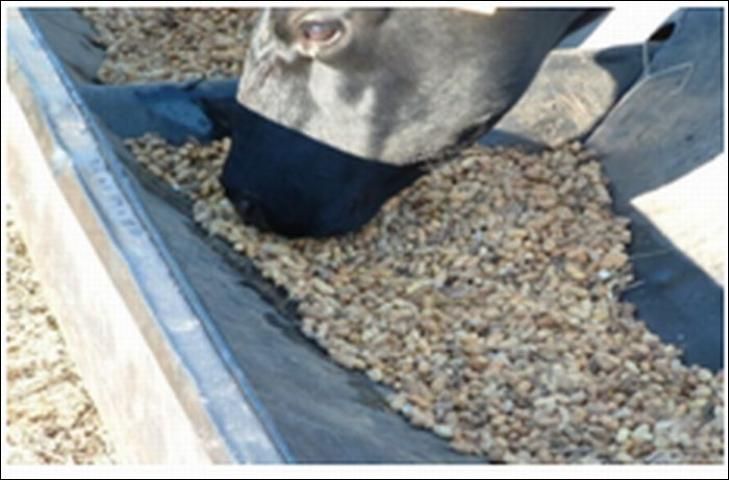
Peanuts not suitable for human consumption, (cull peanuts, also known as "oil stock" peanuts) may offer an easy to feed protein and energy supplement feed for beef cows. Field observations have noted that mature beef cattle will consume raw, whole peanuts—including the shell. Whole peanuts, which are about 10 to 20% shell by weight, typically contain 6 to 8% moisture and, on a dry matter basis, 22 to 26% crude protein (CP) and 36 to 44% oil. The high protein and oil contents of whole peanuts suggest that they could provide supplemental protein and energy in situations where extra protein and/or energy may be required by cattle, such as when consuming grass hay or grazing poor quality pasture.
A two year study was conducted at NFREC Marianna to evaluate raw whole cull peanuts as a potential protein and energy supplement feed for beef cows. The study utilized late gestating mature cows that were fed grass hay during the winter. Cows received whole peanuts as a supplement to 'Tifton 85' bermudagrass hay (7 to 8% crude protein and 53 to 55% TDN) or a 50:50 mixture of ground corn and cottonseed meal as the supplement to the hay. The cows were fed 2 or 3 lbs per head per day of supplement. The exact amount fed was based on cow body condition. The supplements were fed three times during the week. The peanuts were not processed, fed whole, and were oil stock quality.
Average analysis of the whole peanuts used in the mature cow study is presented in Table 1. As an energy source, the whole peanuts were calculated to contain an average of 110% TDN (total digestible nutrients—a measure of the energy value of a feed that is calculated from its composition). For comparison, the corn-cottonseed meal control averaged 25% CP and 82% TDN. Therefore, similar amounts of protein were provided by the two supplements, but more energy was provided by the whole peanut supplement.
Supplement treatment had no effect on cow body condition at the end of the study. However, cow body weight gain over the 84 day periods tended to be lower for cows fed the whole peanut supplement versus the control supplement (80 vs. 108 lbs). Estimated hay consumption was similar for cows receiving either supplement. Subsequent calf birth weight, survival rate and weaning weight, and subsequent cow AI conception rate were not affected by supplement treatment.
The results indicate that cull raw whole peanuts can be a suitable protein and energy supplement for mature beef cows. The peanuts were readily consumed, but it took several hours for total consumption. In an earlier study done at the Coastal Plain Experiment Station in Tifton, GA, growing heifers did not readily consume whole peanuts. The peanuts had to be blended with corn before they were readily consumed by the heifers.
As a word of caution, whole peanuts are high in crude oil (fat) as noted above. Excess fat/oil in the diet of cattle can have a negative effect on digestibility of roughage feeds such as hay. The upper limit before digestibility of hay is negatively impacted appears to be 8% (dry basis, total diet of hay and supplement). When fed at an average of 3 lbs per head per day, the estimated fat content of the total diet in the above cow study averaged 7%. Another caution is that oil stock (cull) peanuts can contain a relatively high level of mycotoxins, especially aflatoxin. These toxins can have a negative effect on cattle health.
In regards to handling and storage, whole peanuts are easy to handle; however, they are hard to auger. They can be stored and handled much like other commodity feeds such as whole cottonseed and soy hull pellets. While peanuts can be fed whole, peanuts should be processed if included in a mixture with other feed ingredients. The best processing option would be coarse grinding utilizing a hammer mill with the screen removed. The shelf life is up to one year for whole peanuts and up to one month for coarsely ground peanuts. Please note that moisture content for good storage for peanuts is lower than for most other commodity feeds (6 to 8% vs. 10 to 14%).
In summary, raw, whole in-shelled peanuts can be an easy to feed, energy and protein supplement feed for mature beef cattle. The best usage appears to be no more than 3 lbs per head per day as that amount with hay would meet protein and energy needs in most situations. Also, more than 3 lbs may result in excessively high fat/oil level in the entire diet (supplement plus hay or grazing).